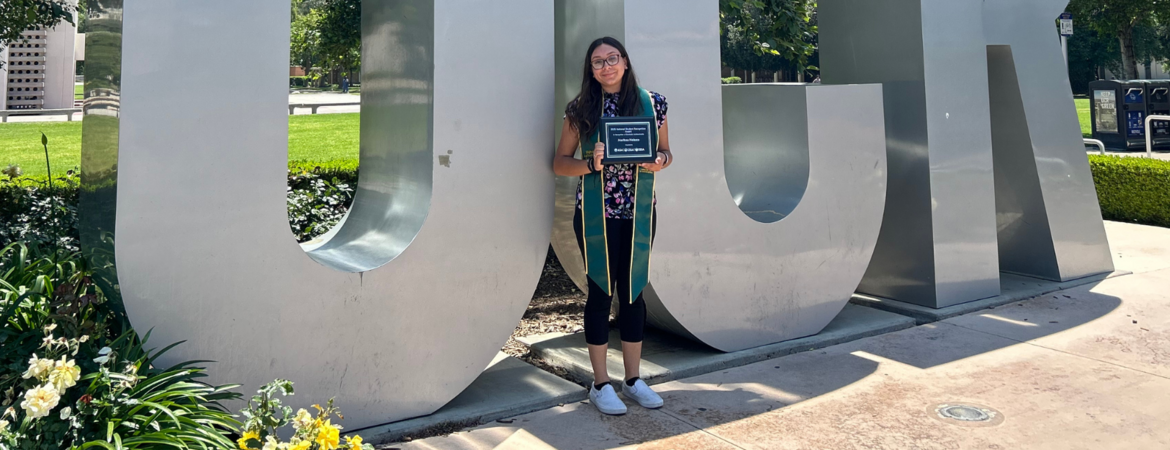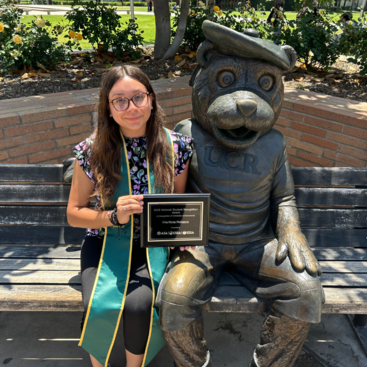
Maritssa Nolasco, a fourth-year Mathematics for Teachers of Secondary School (MTSS) major at the UC Riverside College of Natural & Agricultural Sciences and a Digital Agriculture Fellowship (DAF) participant, has been awarded the 2025 National Student Recognition award.
Co-sponsored by the American Society of Agronomy (ASA), the Crop Science Society of America (CSSA) and the Soil Science Society of America (SSSA), the award is given annually in recognition of scholastic achievements, including research.
"Maritssa was a great member of my team," says Dr. Elia Scudiero, Associate Professor of Precision Agriculture and Agronomy and DAF coordinator. "She had a constant enthusiasm for learning new things, and was a great team player when helping other lab members."
Maritssa grew up in the Coachella Valley, and found herself interested in agriculture from an early age. "In the valley, you see farmers, a lot of soil, a lot of [food] production," she says. "Every time I would pass by, I would think, 'I wonder what goes into this...how does the produce grow?'"
"Maritssa grew up surrounded by agriculture, but never had the chance to get involved with it until she became a DAF student," explains Dr. Scudiero. "I hope she will consider the agricultural sector as a possible future career."
Despite her interest in agriculture, Maritssa came to UC Riverside to pursue another subject: math, and more specifically to become a certified math instructor.
"In high school, my math teachers would ask me to tutor the other students or help them with their homework," explains Maritssa. "My students would say, 'Oh, you teach really well!' I thought, okay, this is my calling...that's why I applied to UC Riverside and enrolled in the Mathematics for Teachers of Secondary School (MTSS) major."
Maritssa credits a visit to UC Riverside's campus as a ninth grader with helping her decide to enroll at the university. "Once I stepped foot on campus, I saw that all the students looked really happy to be here," she remembers. "They were really nice, too...when I would ask questions they would immediately talk to me. It felt like a very friendly environment, and not competitive at all. I really liked that, because I could tell we'd all help each other out."
After she enrolled at UC Riverside, Maritssa learned about a unique opportunity for budding teachers during her freshman seminar, the California Teach-Science and Mathematics (CalTeach-SMI) Initiative, a UC systemwide program providing STEM undergraduate majors with opportunities to explore STEM teaching as they complete their STEM degrees. Maritssa joined the initiative to help prepare for the eventual challenges of teaching in a classroom.
"CalTeach-SMI gives you field experience," explains Maritssa. "You actually get into the classroom and teach lessons. Coming into the program, I was really shy, but these fieldwork experiences, where I'm actually in the classroom observing or teaching a lesson, really helped me find my voice as a teacher."
"During Maritssa's three years of involvement, I've seen her come out of her shyness, becoming a confident and competent leader," says Leslie Bushong, Director of CalTeach-SMI. "She is friendly, creative, and always eager to assist...a natural teacher!"
While preparing for her career as a teacher, Maritssa also kept an eye out for opportunities to explore her interest in math in different contexts. An opportunity presented itself at the end of her freshman year, when she applied for the Digital Agriculture Fellowship (DAF).
"I wanted to see of there was another pathway with math that I wanted to explore as a career," says Maritssa. "Being in the DAF program, you area also placed in the Research in Science & Engineering (RISE) summer research program, so that's how I found out about RISE."
"RISE transforms undergraduate students into undergraduate researchers by providing them with an opportunity to work one-on-one with a faculty mentor on a research project," says Noel Salunga, Assistant Director for Student Success and RISE director. "Participants also get to be part of a summer undergraduate research community that also offers professional development workshops and community building events."
Maritssa remembers being pleasantly surprised by the diversity of the digital agriculture field. "You can work with drones, you can map fields using ArcGIS Pro...it's nice because you really don't have to have much experience in research at all...they help you through everything!"
"Maritssa used on-the-go gamma-ray spectrometry to characterize soil spatial variability in lettuce fields in the Salinas Valley," explains Dr. Scudiero. "Fields with high soil spatial variability are often sites where water and fertilizers are overused, causing a high environmental footprint from agricultural practices. Mari also used high-resolution satellite data to track crop growth and understand its response to soil spatial variability."
While Maritssa admits there was a bit of a learning curve at the beginning of her fellowship, she credits Dr. Scudiero's lab with supporting her throughout her research projects. "When I first started, I new nothing about soil," remembers Maritssa. "We started off slow...I started learning about their research and then moved to doing hands-on soil research. I was really surprised by how welcoming the lab was...I came in knowing nothing and they still took the time to teach me everything!"
Among the many different facets of the DAF fellowship, Maritssa says she enjoyed putting her math skills to work in a new way. "With each soil sample, I was taking and analyzing data and then putting it into ArcGIS, which I had to learn as well. It was cool seeing how you can make data maps that tell you how much water is in the soil and how it affects the growth!"
Despite her lack of experience, Dr. Scudiero describes Maritssa's research as impactful. "At the beginning of her fellowship, Maritssa was a novice in the field of precision agriculture and geographic information systems," says Dr. Scudiero. "Through her time in my lab, her research and analytical sills improved remarkable. Maritssa's research represents a step toward increasing water and fertilizer use sustainability in the Salinas Valley."
"Dr. Scudiero was wonderful and amazing," remembers Maritssa. "He was very welcoming and kind, and very reassuring that it was okay that I didn't know that much about this field."
As a result of her research and scholarly contributions, Mari was also awarded the 2023 Golden Scholar Opportunity by the American Society of Agronomy, which enabled her to present her work at conferences in Fresno, CA and St. Louis, MO.
According to the ASA, the Golden Scholar Opportunity serves to "develop the agronomy, crops, soils, and environmental sciences professions by strengthening the next generation of leaders in the profession."
When Noel asked her to serve as a peer mentor for the DAF program, Mari used her experience to advise other students about scientific presentations.
"One of the questions that came up a lot was DAF participants feeling nervous about having to present their research posters," says Maritssa. "I told them to imagine their audiences were classmates, because that's what really helped me...I told students to not be nervous because the audience will see those nerves. You want your audience to know that you're confident in your research."
"Maritssa was able to share her journey with the students, both as a peer mentor and student assistant during the summer and academic year," says Noel. "She helped DAF students navigate the challenges and stresses of undergraduate research. She is a great example of how, if you are inquisitive about research, work hard to learn with a professor, and open-minded about exploring new fields, you can thrive."
According to Maritssa, serving as a DAF peer mentor gave her the opportunity pay her experience forward. "I got to talk about my experiences, and because I was already in the program, the students felt comfortable coming to me about their research and abstracts," says Maritssa. "It was a nice way to help them out and give them the help I know I would've wanted in the DAF program."
For students considering DAF in the future, Maritssa's advice is simple.
"Definitely apply!" she says. "Even if you don't have that much research experience, you'll learn along the way. DAF really gives you the opportunity to explore your options in that career and research."
After graduation this June, Maritssa will return to UC Riverside to continue working towards becoming a teacher. "I'm entering the UC Riverside credential and master's program for teaching in single-subject math," she says. "I'm looking forward to helping my students and supporting them throughout the math classes I'm going to be teaching."
As she reflects on her UC Riverside experience, Maritssa credits the relationships she built along the way with helping her thrive. "It was pretty amazing!" she remembers. "You build these relationships with other peers...I'm still friends with the students I met during my first year in the dorms. Being a peer mentor and a part of the CalTeach-SMI and DAF programs...it's been helpful sharing my experience with my peers."
Maritssa continues, "These different experiences really helped to mold who I am today, and who I want to be in the future."
